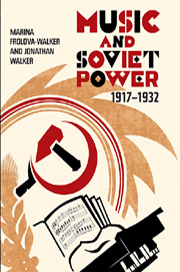Book contents
- Frontmatter
- Contents
- Preface
- Acknowledgements
- Note on transliteration
- Chronology of Political and Musical Events
- October 1917–18: Out of Chaos
- 1919: Depression and Fever
- 1920: Bureaucracy on the Rise
- 1921: Should I stay or should I go?
- 1922: Just Like the Old Days?
- 1923: The Birth of ASM and RAPM
- 1924: ASM in the Ascendant
- 1925: Equilibrium
- 1926: Guests from the West
- 1927: Celebrations
- 1928: At the Crossroads
- 1929: Velikiy perelom – The Great Turning Point
- 1930: RAPM's Glorious Year?
- 1931: RAPM's Fortunes Turning
- 1932: The Rules Change
- Key to Acronyms and Institutional Bodies
- Glossary of Names
- Bibliography
- Index
1921: Should I stay or should I go?
Published online by Cambridge University Press: 05 April 2013
- Frontmatter
- Contents
- Preface
- Acknowledgements
- Note on transliteration
- Chronology of Political and Musical Events
- October 1917–18: Out of Chaos
- 1919: Depression and Fever
- 1920: Bureaucracy on the Rise
- 1921: Should I stay or should I go?
- 1922: Just Like the Old Days?
- 1923: The Birth of ASM and RAPM
- 1924: ASM in the Ascendant
- 1925: Equilibrium
- 1926: Guests from the West
- 1927: Celebrations
- 1928: At the Crossroads
- 1929: Velikiy perelom – The Great Turning Point
- 1930: RAPM's Glorious Year?
- 1931: RAPM's Fortunes Turning
- 1932: The Rules Change
- Key to Acronyms and Institutional Bodies
- Glossary of Names
- Bibliography
- Index
Summary
1921 was a pivotal year for the Russian intelligentsia. The most startling event was the death of the eminent poet, Alexander Blok, which came to be regarded within the intelligentsia as a symbol that cultural continuity was now a forlorn hope. Before Blok died, he had petitioned the government for permission to emigrate in order to undergo much-needed medical treatment abroad. The permission was granted, but too late to save him, and he died shortly afterwards, still in Moscow. A few weeks before his death, he left a poignant note in his diary, which saw flashes of beauty amidst the dreariness:
In Moscow, many members of the intelligentsia – musicians, doctors and others – are cruelly being ejected from their own apartments. Moscow is worse than last year, but are a lot of people around, some managing to look very well … The street is noisy, the cars speed about, it's warm (although not for me), everything is in bloom (the apple trees, lilacs, dandelions, primulas), and we have thunderstorms and showers.
These sentiments were all the more striking because Blok had greeted the October Revolution with enthusiasm, setting to work on one of his greatest, and certainly his most controversial poem, The Twelve, which he published in 1918. Although his present-day reputation is partly based on this work, it lost him much of his existing following, while its mysticism repelled most of the potential support he might have won from senior Bolsheviks.
- Type
- Chapter
- Information
- Music and Soviet Power, 1917–1932 , pp. 54 - 66Publisher: Boydell & BrewerPrint publication year: 2012

